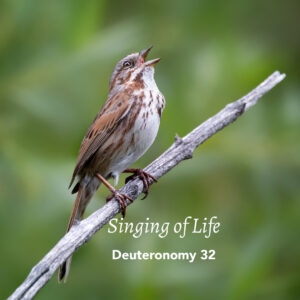Deuteronomy 32: Singing of Life
March 24, 2024
TODAY'S BIBLE READING:
Deuteronomy 32, Psalm 70, Matthew 28:1-10, Romans 15:14-33

How shall we interpret this most remarkable “song”? First, it is important to notice that it is God himself who has commissioned it (Deut. 31:19), and that for a purpose: to “be a witness for [God] against the people of Israel.” In other words, it is a “warning,” as Moses puts it at the end of chapter 32 (v. 46). Moses’ song is full of the least flattering description of God’s people that you could imagine, and is foundational to a worldview of people as inherently wicked, sinful, and therefore needing redemption. This is who we are, and therefore we are rightly “warned” to hide ourselves in Christ and to obey his word with full hearts, honest integrity and passionate commitment.
The song has some famous lines in it:
“The Rock, his work is perfect, for all his ways are justice. A God of faithfulness and without iniquity, just and upright is he” (32:4).
These are words that have been the inspiration to more than one song since, but rarely have those songs taken into account the context of such high flying rhetoric. The point that Moses is making is that God has been faithful, but his people have not! Verse 5: “They have dealt corruptly with him… they are a crooked and twisted generation.” Over and over again, the lesson is that God’s people are not specially good or particularly wise; in fact, their history proves the very reverse. They are foolish and oft stray, as the Old Anglican Prayer Book put it of us all.
There are some important elements of theology taught here. For instance, it is in one place asserted that the false idols that were so often a trap to Israel (and to humanity in general) are “demons that were no gods” or also “gods they had never known” or again “new gods that had come recently” (32:17). Later, “They have made me jealous with what is no god” (32:21). So according to this Song of Moses, false idols are first “demons,” then “no gods at all,” then “gods they had not known,” then “new gods,” then again “no gods at all.”
What then is the existential reality of “other gods”? The answer is that from one point of view there are no other “gods” in true existence other than the One True God. In that sense idols and false gods do not “exist.” On the other hand, inspiring the worship of this deceit is a demonic false. And then again, while they do not exist and are demonically inspired, another way of looking at it is idolatry is very much a real fact of human experience, even though it is a devastating one and is deceitful and is a lie.
Israel is reminded of the story of Jacob and how God “alone” guided him (32:12). They are being told how God has been faithful to them time and time again throughout their history all the way back to the patriarchs. This perspective calls on them to be faithful to the future.
Remarkably, interwoven throughout the song is one key word that ties all the words together: “Rock” (v. 4, 15, 18, 30, 31, 37). Given that Moses is not entering the Promised Land for striking “the rock,” and given that Paul teaches that “the Rock was Christ” (1 Cor. 10:4), this emphasis is noteworthy. Moses is teaching God’s people that the true “Rock,” that is the “firm foundation,” of their faith and life is none other than God himself, which we know from the New Testament is the presence of Christ with them and with us.
The song ends, and then summarizes its significance with a sentence that is worth us all memorizing: “For it is no empty word for you, but your very life” (32:47). God’s Word is not “empty” but is our “very life.” Read it, inwardly digest it, meditate upon it, be moved affectionally by it, and let it therefore transform you to experience vibrancy, vigor, commitment, and the fullness of life that Jesus himself promised to give.
Moses’ death is again foretold (32:48-52): his life is about to move to life after death, and he leaves behind the Book of Deuteronomy, the whole law, as his famous last words to guide us to that same life in Jesus, the real and true Joshua through whom we can enter the Promised Land, life that we can experience now and forever.
ABOUT THE AUTHOR
Josh Moody (Ph.D., University of Cambridge) is the senior pastor of College Church in Wheaton, IL., president and founder of God Centered Life Ministries, and author of several books including How the Bible Can Change Your Life and John 1-12 For You.
WANT MORE?
To receive God Centered Life devotionals directly in your inbox, as well as other resources, enter your email address in the form at the bottom of this page and click "subscribe."

